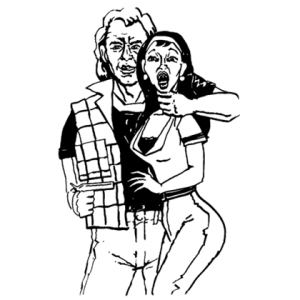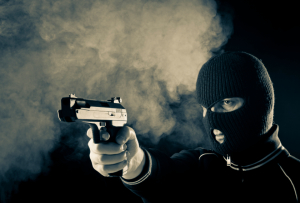In our most recent post, “Justified: Does Pennsylvania Law Allow for Use of Force in Self-Defense?” we discussed the basic principles surrounding self-defense, and when Pennsylvania’s Law Abiding Gun Owners (LAGOs) will have the affirmative defense of justification at their disposal. However, Pennsylvania’s justification laws are not restricted solely to your own personal defense. Under certain circumstances, Pennsylvania law additionally permits the use of force in defense of others.
So you can be that Good Samaritan, if you want to do so.
Unlike some jurisdictions, Pennsylvania does not require that you have a special relationship with the individual you are seeking to protect. Rather, the law requires that, under the facts as you reasonably believe them to be:
- if you were in the same situation of the third party under attack, you would have the legal right to use the force you are going to use,
- the third party would be legally justified in using such force to protect himself, and
- you believe your intervention is necessary to protect the third party.
Here, the focus is on the facts and circumstances as you, the actor, believe them to be. Therefore, if you use force in defense of another as the result of a reasonable mistake, you may still be entitled to this defense. By way of your words, you can easily flush this defense down the drain. So recall our mantra in our previous post, and do not take it lightly: LAWYER UP AND SHUT UP.
The “facts as you believe them to be” must be based upon a reasonable belief. Whether or not your belief is reasonable depends upon the totality of the circumstances. Furthermore, reasonableness is evaluated using an objective standard, rather than a purely subjective standard. The finder of fact (usually the jury) will consider whether a reasonable person under the same or similar circumstances would share your perception, not simply whether you in fact had such a perception.

Alice Cooper guillotine stunt. Photo retrieved from https://www.youtube.com/watch?v=RsRQDhBDvgg on December 2, 2014.
Scenario 1:
Suppose Nicky the Knucklehead attends an Alice Cooper concert. Anybody who has seen Alice perform knows that as part of his act, hooded men captivate him and simulate executing him with a guillotine (sorry for the spoiler, but he’s been doing it for about 40 years). Would Nicky be justified in using force against the hooded men in this instance? No. Given the setting and the nature of the performance, Nicky could not reasonably believe that the events occurring on stage were real. Regardless of Nicky’s subjective belief that Alice was in immediate danger, he would not be justified under an objectively reasonable perception of the facts.
Scenario 2:
On the opposite end of the spectrum, there are more well-defined instances in which use of deadly force in defense of others would likely be reasonable. Here, we observe Larry the LAGO as he stands in the convenience store, looking for a bag of beef jerky. Wally the Worker stands behind the counter, ready to help customers, secretly hoping that his shift will pass a little more quickly. In storms Chris the Criminal, gun raised at Wally. “Empty the cash register or I’ll spread your brains across the wall!” shouts Chris. Hands in the air, Wally claims that he doesn’t have access to any of the store’s money. Chris becomes agitated and says “Now you’ve made me mad. You’re dead.” Can Larry use deadly force in defense of Wally?
Let’s analyze the situation under the law. Under the facts which Larry believes them to be, Chris is about to kill Wally. If Larry was in Wally’s position, (1) would he have the right to use the force he is going to use (deadly force)? Yes. If Larry were in Wally’s shoes, he would have a reasonable belief that deadly force is necessary to prevent death or serious bodily injury. Chris is pointing a gun at him, and has already threatened to kill him with it. Regardless of whether the duty to retreat would apply, there is no opportunity to retreat safely.
Moving on, (2) would Wally be legally justified in using deadly force to protect himself? For the same reasons set forth above, he would. Finally, (3) Larry would have a reasonable belief that his intervention is necessary to protect Wally. Chris’s words and actions indicate that he is about to kill Wally unless Larry intervenes. So if Larry is able to end the threat that is Chris the Criminal, he would be justified under Pennsylvania law.
 Finally, it is possible to reasonably, but inaccurately, perceive the facts as they unfold. Imagine that Larry is back in the convenience store with Wally. Chris storms in, and the events unfold exactly the same way. Larry uses deadly force against Chris. As it turns out, Wally and Chris were in on the entire thing together. The gun wasn’t real, and they staged the entire thing so Chris could walk out with some cash and merchandise. Under the facts as Larry believed them to be, Chris was about to kill Wally and Larry could use deadly force in defense of Wally. Considering the totality of the circumstances, it is likely that Larry’s version of the facts as he believed them to be at the time, was reasonable. To ensure that Larry is afforded this protection, he MUST LAWYER UP AND SHUT UP, lest he risk throwing away his justification defense and his freedom.
Finally, it is possible to reasonably, but inaccurately, perceive the facts as they unfold. Imagine that Larry is back in the convenience store with Wally. Chris storms in, and the events unfold exactly the same way. Larry uses deadly force against Chris. As it turns out, Wally and Chris were in on the entire thing together. The gun wasn’t real, and they staged the entire thing so Chris could walk out with some cash and merchandise. Under the facts as Larry believed them to be, Chris was about to kill Wally and Larry could use deadly force in defense of Wally. Considering the totality of the circumstances, it is likely that Larry’s version of the facts as he believed them to be at the time, was reasonable. To ensure that Larry is afforded this protection, he MUST LAWYER UP AND SHUT UP, lest he risk throwing away his justification defense and his freedom.
Why this protection for reasonable misconceptions of the facts? It would be extremely difficult to protect others if the law required you to be 100% certain of each and every one of the facts.
Imagine Chris the Criminal storming into a building full of his next victims. When he grabs a hostage and threatens to kill them, people would be hesitant to act if doing so required them to rule out every other possibility of what the facts may be. This doesn’t mean that LAGOs can shoot first and ask questions later. It just means that you are not expected to be omniscient in order to protect the life of a fellow citizen. Act responsibly, and if you must use your firearm in defense of yourself or another, clearly and unambiguously invoke your right to silence and demand your attorney.



